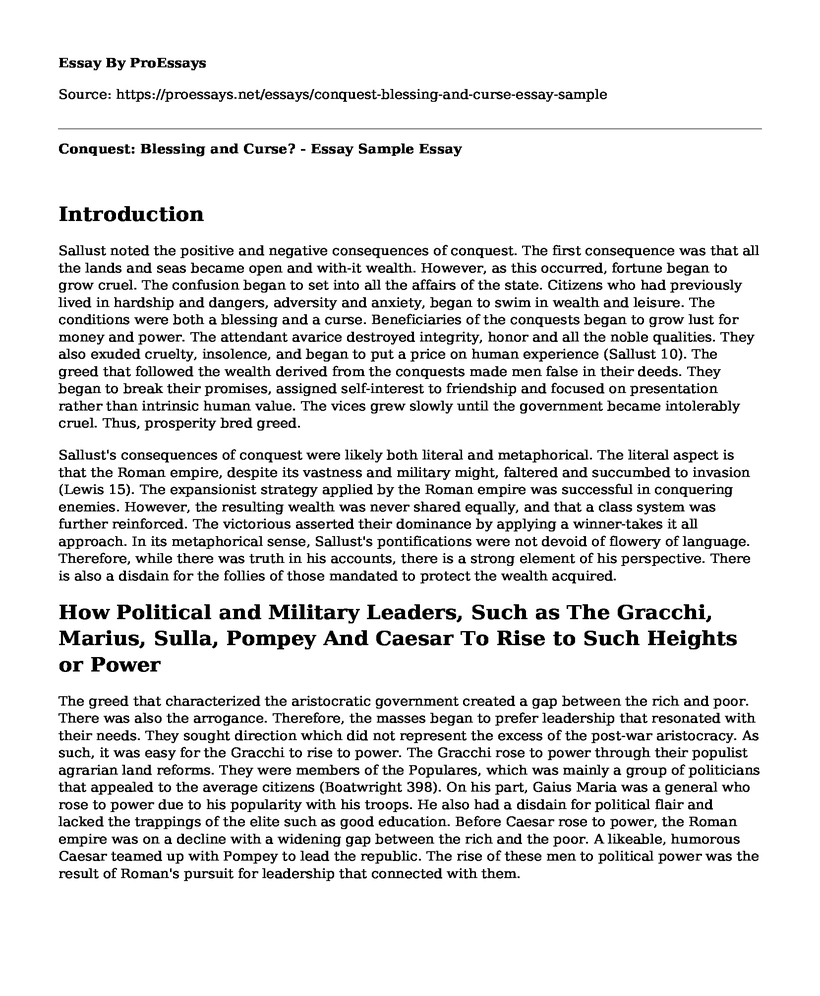Introduction
Sallust noted the positive and negative consequences of conquest. The first consequence was that all the lands and seas became open and with-it wealth. However, as this occurred, fortune began to grow cruel. The confusion began to set into all the affairs of the state. Citizens who had previously lived in hardship and dangers, adversity and anxiety, began to swim in wealth and leisure. The conditions were both a blessing and a curse. Beneficiaries of the conquests began to grow lust for money and power. The attendant avarice destroyed integrity, honor and all the noble qualities. They also exuded cruelty, insolence, and began to put a price on human experience (Sallust 10). The greed that followed the wealth derived from the conquests made men false in their deeds. They began to break their promises, assigned self-interest to friendship and focused on presentation rather than intrinsic human value. The vices grew slowly until the government became intolerably cruel. Thus, prosperity bred greed.
Sallust's consequences of conquest were likely both literal and metaphorical. The literal aspect is that the Roman empire, despite its vastness and military might, faltered and succumbed to invasion (Lewis 15). The expansionist strategy applied by the Roman empire was successful in conquering enemies. However, the resulting wealth was never shared equally, and that a class system was further reinforced. The victorious asserted their dominance by applying a winner-takes it all approach. In its metaphorical sense, Sallust's pontifications were not devoid of flowery of language. Therefore, while there was truth in his accounts, there is a strong element of his perspective. There is also a disdain for the follies of those mandated to protect the wealth acquired.
How Political and Military Leaders, Such as The Gracchi, Marius, Sulla, Pompey And Caesar To Rise to Such Heights or Power
The greed that characterized the aristocratic government created a gap between the rich and poor. There was also the arrogance. Therefore, the masses began to prefer leadership that resonated with their needs. They sought direction which did not represent the excess of the post-war aristocracy. As such, it was easy for the Gracchi to rise to power. The Gracchi rose to power through their populist agrarian land reforms. They were members of the Populares, which was mainly a group of politicians that appealed to the average citizens (Boatwright 398). On his part, Gaius Maria was a general who rose to power due to his popularity with his troops. He also had a disdain for political flair and lacked the trappings of the elite such as good education. Before Caesar rose to power, the Roman empire was on a decline with a widening gap between the rich and the poor. A likeable, humorous Caesar teamed up with Pompey to lead the republic. The rise of these men to political power was the result of Roman's pursuit for leadership that connected with them.
Parallels Between Our History, And This Point in Roman History
Multiple parallels can be drawn from this point in Roman history and the present-day political scene. Like in the case of Rome, the gap between the rich and the poor continues to rise. As a result, it masks the developments recorded. As the Roman republic grew more expansive, so did its woes. Similarly, as technology, as globalization has taken shape, only the upper class has been seen to benefit. Consequently, populations are seen to consider populist leaders who are anti-establishment.
Works Cited
Boatwright, Mary Taliaferro., et al. The Romans: From Village to Empire. Oxford University Press, 2004. ISBN-0-19-511876-6.
Lewis, Naphtali, and Meyer Reinhold. Roman Civilization: Selected Readings. Volume I. Columbia University Press, 1990.
Sallust, Bellum Catilinae, 10-12, Published in the Loeb Classical Library, 1921 (revised 1931) http://penelope.uchicago.edu/Thayer/e/roman/texts/sallust/bellum_catilinae*.html
Cite this page
Conquest: Blessing and Curse? - Essay Sample. (2023, Apr 10). Retrieved from https://proessays.net/essays/conquest-blessing-and-curse-essay-sample
If you are the original author of this essay and no longer wish to have it published on the ProEssays website, please click below to request its removal:
- Dear America: Letters Home From Vietnam
- Essay on Reconstruction Through World War II
- The Roman Empire Never Fell - Essay Sample
- Critical Essay on American Civil War by Terry Jones
- The Legacy of Slavery: US History of African Americans - Essay Sample
- Theatre: Ancient Art Form Since Ancient Greece - Essay Sample
- Essay on Livy's Portrayal of Early Women in Ancient Rome: Weak, Used as Tools, and Always Stimulating Men







